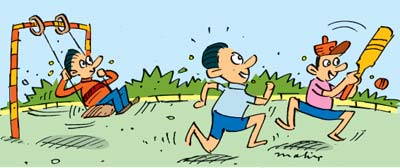|

by
R. S. KARUNARATNE
Different types of auxiliary verbs
Auxiliary verbs are helping verbs. They belong to a small class of
words including primary auxiliaries (Eg. be) and modal auxiliaries (Eg.
can).
Rita is teaching in the classroom.
|

I am reading a book. |
I am writing a letter to Bala.
Children are playing in the park.
Sam was driving his car when the accident occurred.
The girls were making a big kite for the competition.
Nirmala has been studying French since 2007.
The damaged house is being rebuilt.
The auxiliary verb do
has different forms.
Sandra does not study Tamil.
Does he want to join our club?
I do not remember her name.
Why did you do that?
They didn't attend the function.
Following are the different forms of the auxiliary verb 'have'.
Children have done their work.
They haven't (have not) come still.
Diane has passed the exam.
Laura had eaten my chocolate when I went home.
|

Children are playing in the park. |
The auxiliary verb be has many forms.
I am reading a book.
I am not writing an essay.
He is riding a horse.
He is not driving a car.
They are playing football.
They are not playing cricket.
The bridge is being built.
I have been trying to contact him.
The modal auxiliaries do not have `- s forms', '- ing forms' or `- ed
forms'. However, can, may, shall, will have the special past
tense forms could, might, should, would. The other modal
auxiliaries such as must, dare, need, ought to, used to,
do not have such forms.
We can learn English.
I cannot go to China.
They could win the game easily.
We could not attend his birthday party.
You may go now.
You may not sit there.
I shall come at 8 am.
I shall not tell lies.
We will participate in the competition.
We will not fight with them.
You must follow the road rules.
You ought to learn English.
We used to play cricket in the afternoon.
How dare you accuse me of lying?
Note: 'Dare' is also an ordinary transitive verb meaning
"challenge".
Policeman: Why did you assault this tourist?
Suspect: My friends dared me to do it.
Regular and irregular verbs
It is easy to identify regular verbs. The simple past and past
participle of regular verbs end in 'ed'.
****
Infinitive Simple past Past participle
finish finished finished
work worked worked
clean cleaned cleaned
Irregular verbs do not end in ‘ed’ when forming the simple past or past participle.
Infinitive simple past Past participle
hit hit hit
read read read
teach taught taught
There are some verbs which can be regular or irregular.
Infinitive Simple past Past participle
burn burned/burnt burnt
dream dreamed/dreamt dreamt
lean leaned/leant leant
learn learned/learnt learnt
As it is easy to remember regular verbs, it is advisable to be familiar with the following irregular verbs.
A list of some irregular verbs
infinitive past simple past participle
be was/were been
beat beat beaten
become became become
begin began begun
bend bent bent
bet bet bet
bite bit bitten
blow blew blown
break broke broken
bring brought brought
broadcast broadcast broadcast
build built built
burst burst burst
buy bought bought
catch caught caught
choose chose chosen
come came come
cost cost cost
creep crept crept
cut cut cut
deal dealt dealt
dig ug dug
do d done
draw drew drawn
drink drank drunk
drive drove driven
eat ate eaten
fall fell fallen
feed fed fed |


